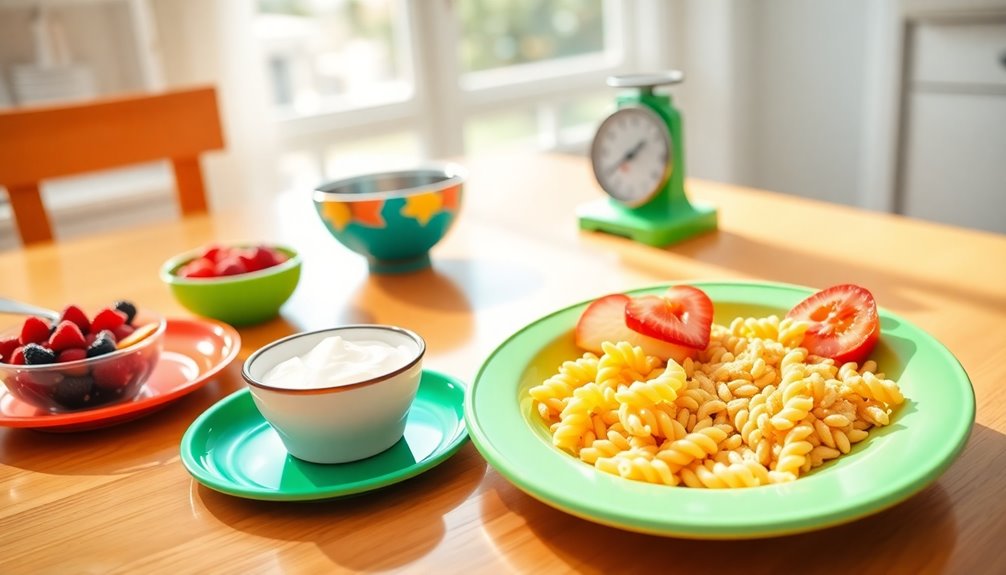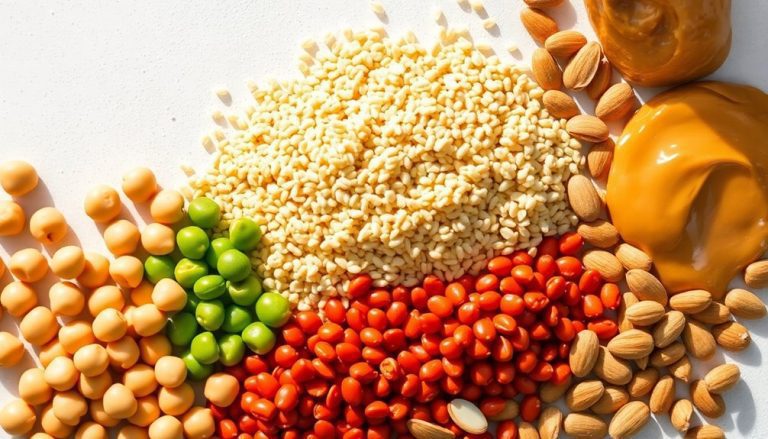A balanced diet is essential for your child's growth and overall well-being. Focus on key nutrients like protein for tissue repair, calcium for strong bones, and iron for energy. For portion sizes, use your child's fist for fruits and veggies, their palm for protein, and cupped hand for grains. Encourage healthy snacks like fresh fruits, veggies with hummus, and whole grains. Hydration is crucial, so make water the drink of choice. Involve your kids in meal planning to build healthy habits. Discover more strategies to support their nutritional journey as they grow and develop.
Key Takeaways
- Ensure a balanced diet rich in proteins, calcium, iron, and vitamins for optimal growth and development.
- Involve kids in meal planning and grocery shopping to foster healthy food choices and habits.
- Establish regular meal and snack times to discourage unhealthy snacking and promote mindfulness around food.
- Encourage hydration by prioritizing water intake and incorporating water-rich foods to maintain energy and focus.
- Promote regular physical activity, aiming for 60 minutes of aerobic exercise daily to support overall health and well-being.
Importance of Balanced Diet

A balanced diet is essential for kids and teens as it fuels their growth and development. When you provide your body with the right mix of nutrients, it helps you reach your full potential physically and mentally. Additionally, incorporating quality plant food into your diet can enhance the nutritional value of your meals.
You need a variety of foods that include fruits, vegetables, whole grains, lean proteins, and healthy fats to maintain energy levels and support daily activities.
Eating a balanced diet also plays a crucial role in building a strong immune system. With the right nutrients, your body can fight off illnesses more effectively, keeping you healthy and active.
You'll find that a nutritious diet can enhance your concentration and mood, making it easier to focus in school and enjoy social interactions.
Additionally, developing healthy eating habits early on sets the foundation for a lifetime of wellness. It's not just about avoiding junk food; it's about learning to enjoy a diverse range of wholesome foods.
By prioritizing a balanced diet, you empower yourself to make better choices, leading to improved overall health and well-being. Furthermore, understanding the importance of nutritional guidelines for kids can help you make informed food choices.
Key Nutrients for Growth
Essential for growth, certain key nutrients play a vital role in supporting the development of kids and teens. These nutrients help ensure that your body functions properly, promotes healthy growth, and supports overall well-being. Here's a quick overview of the essential nutrients you should focus on:
| Nutrient | Functions | Food Sources |
|---|---|---|
| Protein | Builds and repairs tissues | Meat, beans, nuts, dairy |
| Calcium | Supports bone health | Milk, yogurt, leafy greens |
| Iron | Aids in oxygen transport | Red meat, beans, spinach |
| Vitamin D | Enhances calcium absorption | Sunlight, fish, fortified milk |
Make sure you include a variety of these foods in your diet. By doing so, you'll give your body the tools it needs to grow strong and healthy. Remember, each nutrient plays its part, so a balanced diet rich in these essentials will set you up for success. Prioritize these key nutrients, and you'll notice the positive impact on your growth and development. Additionally, just as plants benefit from fertilizer tablets, ensuring you receive adequate nutrients can enhance your overall health and vitality. Furthermore, composting organic waste can create nutrient-rich soil that promotes the growth of healthy food sources for your diet.
Portion Sizes for Kids

Understanding portion sizes is crucial for kids as they navigate their growth and development. You want to ensure that your child gets the right amount of food to fuel their activities while maintaining a healthy weight. Generally, portion sizes for kids should be smaller than those for adults, but they do vary based on age, activity level, and individual needs.
A good rule of thumb is to use your child's fist as a guide for serving sizes: a fist-sized portion of fruits or vegetables, a palm-sized portion of protein, and a cupped hand for grains.
When it comes to snacks, keep it simple. A small handful of nuts or a piece of fruit can be just right.
Teaching your child to listen to their hunger cues is equally important. Encourage them to eat when they're hungry and stop when they're full. This practice fosters a healthy relationship with food and helps them recognize their body's needs. Additionally, incorporating nutritional plant care into their diet can provide essential vitamins and minerals that support their overall health.
Healthy Snack Options
Snacking can be a great opportunity to fuel your child's body with nutrients and energy. Instead of reaching for sugary treats, encourage healthier options that provide lasting satisfaction. Fresh fruits like apples, bananas, or berries are packed with vitamins and fiber, making them perfect snacks. You can pair fruits with nut butter for added protein.
Vegetables are another fantastic choice. Carrot sticks, cucumber slices, and bell pepper strips can be enjoyed with hummus or yogurt dip. These crunchy options are low in calories and high in nutrients.
Whole grain snacks, like whole grain crackers or popcorn, are great too. They offer fiber and can keep your child full longer. Consider offering cheese sticks or yogurt for a calcium boost; both are tasty and nutritious.
Dried fruits can also hit the spot, but be mindful of portions since they're calorie-dense. Trail mixes with nuts and seeds provide healthy fats and protein, and they're easy to prepare at home.
Hydration and Its Benefits

Staying hydrated is crucial for kids and teens as it supports their growth, energy levels, and overall well-being. Water plays a vital role in numerous bodily functions, including regulating body temperature, transporting nutrients, and removing waste.
When you're well-hydrated, you'll likely feel more focused and energized, which is especially important during school and physical activities.
To ensure you're getting enough fluids, aim to drink water throughout the day, especially before, during, and after exercise. Thirst is a sign that your body needs more water, so don't wait until you're parched to hydrate.
You can also incorporate water-rich foods like fruits and vegetables into your diet, such as watermelon, cucumbers, and oranges, which can help boost your hydration levels.
It's a good idea to carry a reusable water bottle with you, making it easier to sip throughout the day.
Remember, sugary drinks like soda and sports drinks can lead to dehydration, so it's best to limit those. By prioritizing hydration, you're setting yourself up for a healthier, more active lifestyle.
Stay aware of your body's needs, and make hydration a daily habit!
Meal Planning Tips
Meal planning can be a game-changer for you and your family, helping to ensure that everyone gets the right nutrients throughout the week. By taking the time to plan meals, you can save money, reduce food waste, and make healthier choices.
Here are some tips to make meal planning easier and more enjoyable:
- Involve Everyone: Get your kids and teens involved in the planning process. Let them pick out recipes or ingredients they'd like to try.
- Create a Schedule: Designate a specific day each week for planning and shopping. Consistency helps build a routine.
- Prep Ahead: Spend some time on the weekend preparing meals or chopping veggies. This will save you time during busy weekdays.
- Mix It Up: Include a variety of foods to keep meals exciting. Rotate through different proteins, grains, and vegetables.
- Make a List: Before heading to the grocery store, create a shopping list based on your meal plan. This will help you stick to your budget and avoid impulse buys.
Encouraging Healthy Eating Habits

Creating a meal plan is just the first step towards fostering healthy eating habits in your kids and teens. To truly encourage these habits, involve them in the planning and preparation process. Let them pick a few healthy recipes they'd like to try, and take them grocery shopping. This hands-on approach makes them more invested in what they eat.
Next, establish consistent meal and snack times. When kids know what to expect, they're less likely to reach for unhealthy snacks. You should also model healthy eating yourself; kids are more likely to adopt habits they see in their parents.
Make family meals a priority, as this encourages conversation about food choices and helps reinforce positive habits. Limit access to junk food at home. Instead, stock up on fresh fruits, vegetables, whole grains, and lean proteins.
Encourage your kids to try new foods, but don't pressure them—exposure can lead to acceptance over time. Lastly, celebrate progress. When they make healthier choices, acknowledge their efforts.
These simple strategies can significantly impact your kids' long-term relationship with food, setting them up for a lifetime of healthy eating habits.
Addressing Dietary Restrictions
Navigating dietary restrictions can feel overwhelming, but it's essential to ensure your kids and teens still enjoy a varied and nutritious diet.
Whether your child has allergies, intolerances, or specific dietary preferences, you can create meals that are both safe and satisfying. Start by educating yourself about their needs and exploring alternatives.
Incorporate a variety of foods to keep meals interesting and balanced. Here are some tips to help you along the way:
- Experiment with substitutes: Use almond milk instead of dairy or gluten-free pasta in your favorite recipes.
- Plan meals together: Involve your kids in meal planning to encourage them to try new foods.
- Read labels: Always check ingredient lists for hidden allergens or unwanted additives.
- Cook from scratch: Homemade meals allow you to control ingredients and ensure safety.
- Stay flexible: Adapt recipes based on what works for your child, and don't hesitate to try new combinations.
Role of Physical Activity

Physical activity plays a vital role in the overall health and well-being of kids and teens, complementing a balanced diet. Regular exercise helps you maintain a healthy weight, strengthens muscles and bones, and boosts your mood. It also enhances academic performance by improving focus and memory.
To understand the benefits of physical activity, here's a quick overview:
| Type of Activity | Benefits | Recommended Duration |
|---|---|---|
| Aerobic Exercises | Improves cardiovascular health | 60 minutes daily |
| Strength Training | Builds muscle and bone strength | 2-3 times a week |
| Flexibility Exercises | Enhances flexibility and balance | Daily |
| Recreational Sports | Encourages teamwork and social skills | Varies based on interest |
Incorporating a mix of these activities into your routine keeps things fun and engaging. Whether it's playing a sport, going for a bike ride, or dancing, find what you enjoy. Remember, the goal is to stay active and have fun while reaping the numerous health benefits. So, lace up those shoes and get moving!
Frequently Asked Questions
How Can Parents Involve Kids in Meal Preparation?
Involve your kids in meal preparation by assigning them tasks like washing veggies, measuring ingredients, or stirring mixtures. It'll spark their interest in cooking and help them develop valuable skills while enjoying time together.
Are There Specific Diets Recommended for Picky Eaters?
If you're dealing with picky eaters, focus on balanced meals they enjoy. Incorporate their favorite foods in creative ways, and gradually introduce new flavors. It'll help them develop a broader palate over time.
What Are the Signs of Nutritional Deficiencies in Children?
If your child's energy resembles a wilting flower, it might signal nutritional deficiencies. Look for signs like fatigue, irritability, slow growth, and poor concentration. These clues can help you ensure their health blooms fully.
How Can Family Routines Promote Better Eating Habits?
Family routines can boost your eating habits by creating consistency. You can plan meals together, enjoy family dinners, and involve kids in cooking, making healthy choices enjoyable and instilling lifelong habits that stick.
What Role Do Vitamins and Supplements Play for Kids?
Have you ever wondered why kids need vitamins and supplements? They help fill nutritional gaps, support growth, and boost immune functions. However, a balanced diet should always come first—supplements are just that, not replacements.
Conclusion
So, there you have it! If you want your kids to grow up strong and healthy, just follow these guidelines—because who wouldn't want their child to resemble a superhero rather than a couch potato? Remember, balanced meals and hydration are key; after all, nobody wants a future adult who thinks pizza counts as a vegetable! With a little planning and creativity, you can make healthy eating as exciting as a treasure hunt—minus the actual treasure, of course!




